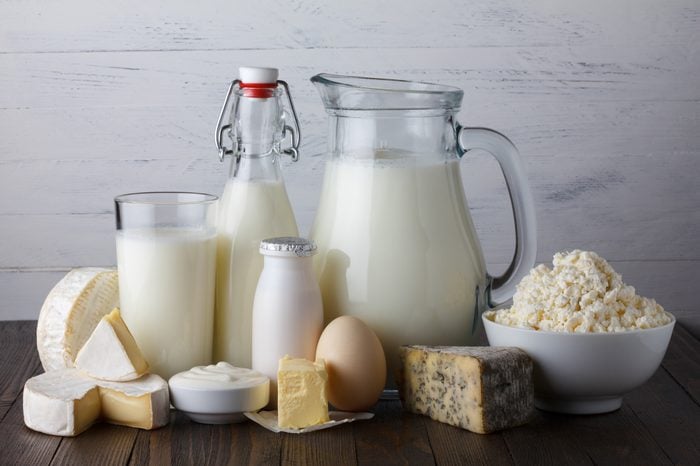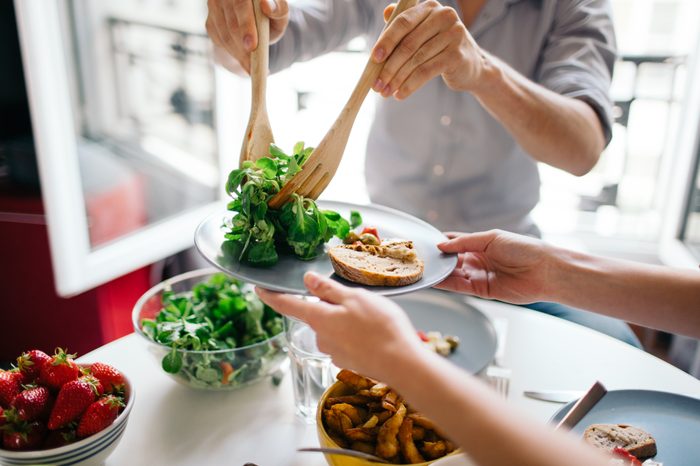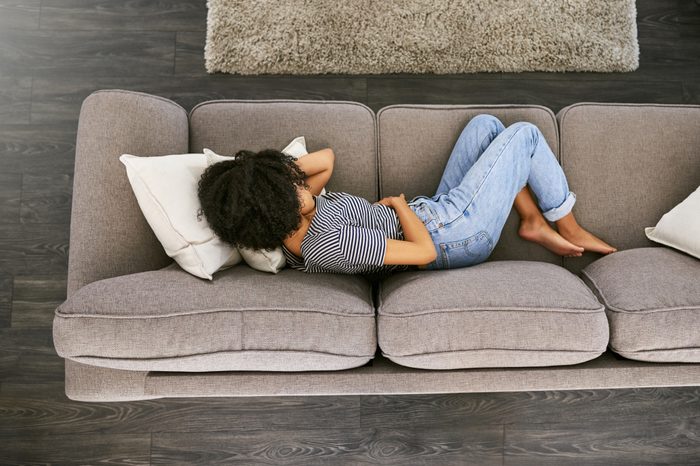What is constipation?
If you have constipation—less than three bowel movements a week, dry or lumpy stool, and/or stool that is hard to pass—you should know that every year around 2.5 million people in the US visit their doctor for this problem, so you’re not alone. This common problem can be be caused by anything from depression to low-carb diets. Here are some of the many factors that might cause constipation.

Sitting too much
When figuring out what causes constipation, the answers may be surprising. Our modern sedentary lifestyle is bad for more than just your waistline, says Atif Iqbal, MD, a gastroenterologist and medical director of the Digestive Care Center at Orange Coast Medical Center, in Fountain Valley, California. Staying in a sitting position for long periods of time kinks up your colon, discouraging stool from passing through and causing constipation. Take regular breaks to stand up and move around. Walking and deep squats, in particular, are two movements that are particularly effective for producing a bowel movement. If constipation is a chronic problem and you don’t feel like squatting on top of your toilet, many have found relief using a “squatty potty,” which elevates the legs to a more natural pooping position.

A dairy-heavy diet
Cheeseheads, take note: Eating a lot of this melty, delicious food is one of the main explanations for constipation, says Dr. Iqbal. While all dairy products have the potential to stop you up, cheese seems to be the biggest digestive troublemaker—not because it’s inherently constipating but because many people eat it instead of healthier fiber-filled foods like whole grains, fruits, and veggies. If you’re eating pizza, for example, you’re probably not eating a salad. Make sure that you save room in your stomach for fiber-filled fare. A review of studies published in 2018 in The American Journal of Clinical Nutrition suggests that eating a high-fiber diet reduces your risk for cardiovascular disease, stroke, type 2 diabetes, and several cancers (including pancreatic, gastric, colon, and breast). Generally, this is most often an issue for children. (Here are the things that your bowel movement can reveal about your health.)

Depression
If a bout of depression has you gaining weight or feeling constipated, there’s a reason for that. “Depression slows your overall metabolism,” Dr. Iqbal explains. Worse, the medications most commonly prescribed to treat depression are also constipating. A review of studies in BMJ Open shows that there are many non-pharmaceutical therapies for depression, some of which have been shown to be as effective as meds. These include cognitive behavioral therapy, exercise, and meditation.

Low-carb diets
One of the biggest complaints people have after embarking on a low-carb/high-protein diet is constipation. And for good reason: Eating a diet that focuses on meat, eggs, and fat leaves little room for plant fiber, says Dr. Iqbal. Even worse, many people consciously avoid fiber-filled foods like whole grains, fruits, and vegetables because they are high in carbohydrates. Remember, all carbohydrates are not created equal. Focus on just eliminating highly processed carbs or foods with a high glycemic index, like sugary treats and white bread. To keep your colon healthy and prevent constipation, make sure you get at least five servings of fruits and veggies a day. (The one exception: bananas, which can be constipating on their own.) Look out for these 10 other foods that can make constipation worse.

Too much fiber
How can fiber, a go-to constipation treatment also be the cause of constipation? Here’s how: Overdosing on fiber can desensitize your stomach lining, making it less responsive to signals to evacuate, Dr. Iqbal explains. This is especially true when people are getting mega doses of fiber from supplements like pills or powders rather than from whole food sources. Skip the fiber pills. Not only is there little scientific evidence to show they work, but they may be working against you, at least in the poop department. A review of studies published in 2017 in the Journal of the American Association of Nurse Practitioners shows that although fiber supplements can appear to be a healthy way to increase fiber intake, most don’t provide any of the health benefits associated with a high‐fiber diet. Still backed up? Your doctor may even temporarily recommend removing fibrous foods from your diet to give your gut a chance to reset.

Chocolate
Not the best news for those with a sweet tooth: Chocolate can be constipating, although the effect appears to vary from person to person. Research is limited, but one study in the European Journal of Gastroenterology & Hepatology found that chocolate is a major offender. When patients were asked which foods or beverages caused constipation, chocolate was mentioned most often (followed by white bread and bananas). There’s no way to tell if chocolate is contributing to your constipation problem unless you completely eliminate it from your diet for a period of time. Start with two weeks and if your constipation improves, then limit the sweet stuff to special occasions.

Laxatives
If you’re painfully constipated, taking a laxative may seem like the best solution. Unfortunately, this could just make your problem worse, Dr. Iqbal explains. Laxatives are meant to be used only on a short-term basis, for a week at most. Any longer and you risk making your bowels dependent, which can start a vicious cycle of constipation and diarrhea. Before you turn to medication for constipation, it’s always best to identify what causes constipation for you and treat that first, he says. Evaluate your lifestyle, dietary habits, exercise, and medications to see what’s causing the problem before popping a laxative. Make sure you know these 15 foods that are natural laxatives.

Prescription medications
All medications have side effects. And a surprising number list constipation as one of them. Antidepressants (particularly SSRIs like Prozac), anti-anxiety drugs, heartburn medications, and blood pressure pills are the most common offenders, Dr. Iqbal says. There might be another prescription medication option, Dr. Iqbal explains. “You just need to be clear with your doctor about what problems you’re experiencing.” For instance, he says the calcium in many heartburn medications can cause constipation so instead opt for ones that rely on magnesium to work. Or if you’re on a calcium-channel blocker for high blood pressure, you can try a beta-blocker instead. Of course, any changes to your medications should be done under medical supervision. Here are 7 smart tricks to avoid constipation while traveling.

Certain multivitamins
Vitamins with high levels of calcium and iron can be extremely constipating, Dr. Iqbal says, and yet many people don’t realize this and take one every day. “Certain minerals, especially in amounts over the recommended daily dosing, can slow down digestion in the large bowel,” he explains. Only people known to have a medical issue that requires supplemental iron, such as iron-deficient anemia, should use supplemental iron, and then only if recommended to do so by their doctor.

Painkillers
Anyone who’s endured surgery likely knows that painkillers can cause constipation, sometimes major constipation. But this can also apply to prescription opiates like hydrocodone and oxycontin. Occasionally this is also true for over-the-counter meds like acetaminophen and ibuprofen. “These medications bind to the same receptors in the stomach, blunting the whole digestive system as well as your pain,” he explains. While taking painkillers, you should make every effort to resolve the underlying injury or find other ways of treating the pain. In the meantime, take a daily stool softener along with the pain pills. (Here are 6 hidden dangers of over-the-counter pain relievers.)

Out-of-whack hormones
As any pregnant woman can tell you, hormones can do a number on your digestive system. In particular, high levels of estrogen and progesterone or low levels of testosterone can be constipating. In the case of pregnancy, the “cure” will come in nine months, but for other hormonal imbalances it’s best to cure the underlying condition first, Dr. Iqbal says. As we age, our hormone levels naturally fluctuate so if you feel out of sorts, talk to your doctor about possible therapies and lifestyle changes. (Check out these 21 health secrets your gut is trying to tell you.)

Dehydration
Not drinking enough water is another common cause of constipation. Make sure you have plenty of fluids to keep things regular, per the National Institute of Diabetes and Digestive and Kidney Diseases (NIH). If you aim for eight full glasses of water a day, this is what will happen to your body. However, also keep in mind you can drink too much water too.

Undiagnosed medical conditions
A huge range of health conditions can cause constipation, Dr. Iqbal says. The most common one he sees, particularly in younger people, is hypothyroidism. “Your thyroid controls your metabolism so when it’s not functioning well, everything slows down, including your gut,” he explains. Other illnesses that have constipation as a major symptom include diabetes, multiple sclerosis, Celiac disease, autoimmune disorders, and some cancers. The most important thing is to identify the underlying cause and treat that. “Because constipation is so common, many people ignore it,” Dr. Iqbal says. “Most of the time it’s not a big deal but sometimes it is indicative of a larger problem.” If your constipation comes with other symptoms, has changed significantly, or if it’s lasted longer than three months, ask your doctor for a full medical work-up to look for illness. Make sure you’re not showing any of these other silent colon cancer symptoms. And don’t miss these 11 surprising home remedies for constipation relief.
